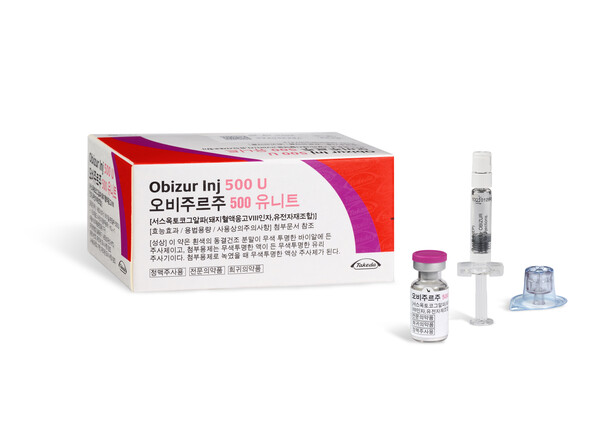Takeda Korea said the National Health Insurance will reimburse its adult acquired hemophilia A (AHA) treatment Objzur Inj (susoctocog alpha) starting Thursday.

Obizur is Korea's only blood clotting factor VIII treatment for adult AHA. It won the Ministry of Food and Drug Safety approval in March last year.
According to the relative notice, Obizur will get insurance benefits for treating bleeding in adult patients with acquired hemophilia A if the antibody titer is more than 5BU (Bethesda unit); if a patient with antibody titer of less 5BU or less does not respond to high doses of antithrombotic factors; and if a patient with a recent antibody titer of 5BU or less does not respond to high doses of antithrombotic factors but responds to Obizur.
Adult AHA is a rare disorder in which autoimmune antibodies to the eight blood clotting factors develop, resulting in bleeding-related complications. Unlike congenital hemophilia, it has an acute course and bleeding in soft tissue areas, including muscle and skin. It is reported more frequently than in congenital hemophilia, with severe bleeding occurring in 70-90 percent of patients.
Unlike congenital hemophilia A, the severity of the disease cannot be determined by blood levels of the coagulation factor VIII, and so requires immediate control when there is clinically significant bleeding.
Obizur is a recombinant product made by removing the B-domain from human-like porcine factor VIII, which is not readily recognized by the body's immune antibodies and can, therefore, replace inactivated human factor VIII to aid in blood clotting and help control bleeding. This mechanism makes Obizur the only treatment for adult AHA that reliably monitors blood factor VIII levels using standard assays, allowing for personalized dosing.
Obizur’s clinical efficacy was confirmed in a prospective, open-label phase 2/3 study in adult AHA patients.
Twenty-eight patients treated with Obizur showed a positive response to an initial bleeding episode, assessed 24 hours after the first dose. A positive response at the time of efficacy was pre-defined as cessation or reduction of bleeding, clinical control, stability, or improvement, other reasons for bleeding, and factor VIII activity of 20 percent or higher.
At the time of the last dose (within two weeks of dosing), the cure rate was 85.7 percent, with a higher cure rate in patients who received Obizur as first- and second-line treatment, with 94 percent and 73 percent cure rates in patients who received Obizur as first-line treatment.
"We are pleased that this reimbursement will allow adult patients with acquired hemophilia A to benefit from Obizur, which helps control bleeding by replacing the deficient factor VIII, as a first-line treatment,” said Kim Na-kyung head of the Rare Blood Disorders Business Unit at Takeda Korea.
Kim added that the company would continue to develop and supply innovative therapies for patients with hemophilia and other rare blood disorders and strive to improve the treatment environment and access for patients.
Related articles
- Hemlibra’s post-dose bleeding frequency study published in international journal
- Sanofi voluntarily recalls hemophilia A drug due to labeling error in Korea
- Hemlibra reduces bleeding and joint pain while improving mobility
- ‘Hemophilia patients’ quality of life depends on minimizing joint damage through prophylaxis’
- ‘Goal of treating hemophilia is to normalize life like a non-patient’

